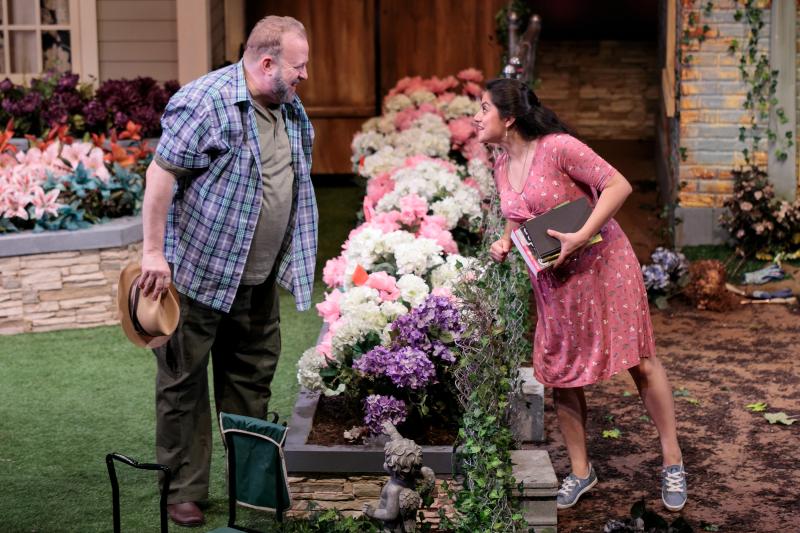Interview: Daniel Jaquez Brings “Intelligent Comedy” to Life at Aurora Theatre

This weekend as NATIVE GARDENS continues at Aurora Theatre, director Daniel Jáquez will be showing his range as an artist.
Typically taking the helm on dramas rather than comedies, Jáquez's latest project is a hilarious romp through the very real world of neighbor relations and the American dream. The thought-provoking comedy is a natural step for the director who has known NATIVE GARDENS playwright Karen Zacarias for some time and has had the unique opportunity of discussing and experiencing her works right alongside her over the years. In the conversation below, check out what Jáquez has to say about the outrageous nature of this work, how he has seen these characters in real life, and which moments will always make him laugh.
How has your experience with NATIVE GARDENS been so far?
So far so good! For me rehearsal is the best time ever. It's where everybody just shows their creativity, their vulnerability, and they push extremes and try to find the truth of their characters and how they fit in their bodies. And I have four amazing actors! Amazing, amazing. I'm loving it, and I know [Aurora Theatre co-owner Anthony Rodriguez] from a long time ago, so it feels like coming back home!
So what can you tell my readers about this show?
It's about two couples- One is the Butleys, the wealthy white couple already established in Georgetown, and then next door, this up and coming wealthy Latino family the Del Valles moves in, and that just creates an opportunity to know each other. The male, Pablo is from another country, but he was here in boarding school because he comes from a wealthy family in Chile. There are conversations in the play about social class. In each of the couples, one was very wealthy, and the other one was a commoner but came up. Their parents struggled to get food on the table, but they both came up in the world.
And then the crux of this whole play without giving it all away is we discover that the Butleys, the older white couple, have been growing flower beds on their neighbors' side of the land as the years have gone by. So now it becomes a conversation not about race, not about age, not about any of that, but about the American dream of home, you know? Do we have a right to our property? Do we have a right to our land?

So it's all in there in a way that you don't realize it's all in there, and that's the magic of this play, and that's why it's being produced everywhere. It's been a big hit. It extends everywhere. It's a very intelligent comedy that talks about our times, and it can be described as hilarious and outrageous. I'm not usually a comedy kind of director, but the good thing about this play is that if you find the truth of these characters which we are really finding, that gives us the comedy.
And I think all of us are able to listen to certain issues at certain points in our lives, and you might not listen to all of them, but you hear the ones that you're supposed to hear, or you're ready to hear. And Karen is brilliant. She's a very good friend of mine- I've known her for over 15 years.
So the combination of these characters presents a sort of safety net for the conversation, but it really dives deep into these characters and sometimes the absurdity of our beliefs is what makes us laugh. I mean, half the time you go, "Uh oh! She didn't go there! Oh he didn't do that!" What we say in private is very different from what we say with other people. And Karen very carefully lets us see the private moments between these two couples.
It sounds like one of those where the audience will be having a great time and having fun, but it sounds like from what you're describing, there will be moments that just hit them like, "Oh my gosh! I've seen that in myself!" or "I've seen that in other people!"
Yes, most definitely. And Karen includes a chorus of two to four- we're using two- to be the gardener, the surveyors, and a lot of people that are usually silent roles. She describes them as witnesses to these two worlds, but they are the workers. They're people who really don't want to participate in the political process. They want to live their lives, have fun, work, make money, and put food on the table. So we follow the play through them. They break the fourth wall and have a relationship with the audience. So they try to remain neutral, they just observe, just doing their job. So it's a great dynamic that she's created there.
You mentioned something about the couples being a safety net... can you say more about that?
When you confront two social classes on stage, there's always the winner, the loser, the poor, the powerful, and the weak. So what Karen does is she wants to have these conversations of difference of power, but instead of putting two weak people in here, she puts two strong couples that have experienced wealth, and part of the family has experienced struggling to make ends meet. So all of a sudden when you have two balanced sets of protagonists, you're able to listen and go back and forth without really taking sides yet.
So that's what I mean, in the sense that we don't judge. We all come in with some preconceptions based on our experiences in life, and the dynamics within these two couples is such that you see it, but you don't realize that you're prejudiced until you start hearing things and think, "Oh, I know people who do that! I've said that before without realizing the consequences!" So it's powerful in the sense that they tackle everything.
Each of them is as flawed and as positive as the people in this country. That's the deep side, but it's all told from a story that everybody's going to say, "Ok, let's start a conversation," or "Wow, yes that's how they see me," or "That's how I see them." And then you just laugh. You just laugh at the absurdity of it all. You laugh at both of them trying to be liked by the other couple.
Are there moments that you laugh at every time and feel like you will continue to laugh at through the whole run?
Oh yes. With the innocence of Frank, the older white character that's the actual gardener, he just wants to win this gardening competition so badly, and he has some beautiful moments. And it's also Bart's timing. He just makes you laugh like crazy because he's going through so much pain. There is also a scene where Tania Del Valle comes out eating ice cream at seven in the morning, and the way she handles the spoon while she's eating and hitting her husband with the spoon, it's very funny!
It sounds like a great mix of hilarity and absurdity while being really truthful. And I think a really good way to dive into deep conversations is through comedy, so I'm glad this play is doing it that way.
Yes, yes. I think that, like I told you, I love to focus on the seriousness of the issues and the truthfulness of the characters. I saw a production about a year and a half ago, and it was just all big and slapstick, and it didn't feel right to me. And I was wondering why, because the audience still laughed, and it was hilarious. Then I talked to Karen a little bit, and she said, "You know, Daniel, I started writing this play as a drama, as a conflict of neighbors," and as she was developing, she discovered that this is better served as a comedy. Karen Zacarias is the most produced Latina in the United States, and almost the most produced one of the top ten most produced playwrights, and with NATIVE GARDENS, everyone can come and hear from a voice that might be new to them.
Is there anything else you'd like to say to our BroadwayWorld readers today?
Pay attention to Aurora. They're getting a lot of recognition, but they're doing wonderful and challenging work that pushes the envelope of your average theatregoer, and I love it when a regional theatre really gets strong and decides that they have a voice and a responsibility to their community to go beyond entertainment and to go back to the roots of theatre.
NATIVE GARDENS will play at Aurora Theatre May 2 - June 2, with discount matinees on Tuesday, May 14 and 21. Tickets are currently on sale; single tickets start at $20 and may be purchased online at bit.ly/ATNativeGardens or by calling the Box Office at 678-226-6222. For more information on this production or other programming, please visit auroratheatre.com.
Daniel Jáquez is a Director, Theater-Maker and Translator of plays who recently relocated to San Diego after being in New York City for almost 30 years. He serves on the Latinx Theatre Commons Steering Committee and is a member of the Stage Directors and Choreographers Society. In New York City, Jáquez was the Director and co-founder of Unit52, Intar Theatre's young acting company, and the Director of INTAR/Jerome Foundation NewWorks Lab, a festival that produced 4 new plays by emerging Latinx playwrights annually.
For the past 10 years, he has been involved with the Lark Play Development Center's U.S./México Playwright Exchange as a member of its Advisory Committee, a director and a translator. Jáquez spent a season (2015-2016) in Portland, OR serving as Interim Artistic Director of Milagro Theatre where he directed several productions in Spanish and English and received Portland's DRAMMY award for outstanding direction. Jáquez earned an M.F.A. in Directing from Institute for Advanced Theater Training at Harvard/Moscow Art Theatre, and a B.S. in Mathematics from the University of Texas.
Videos
